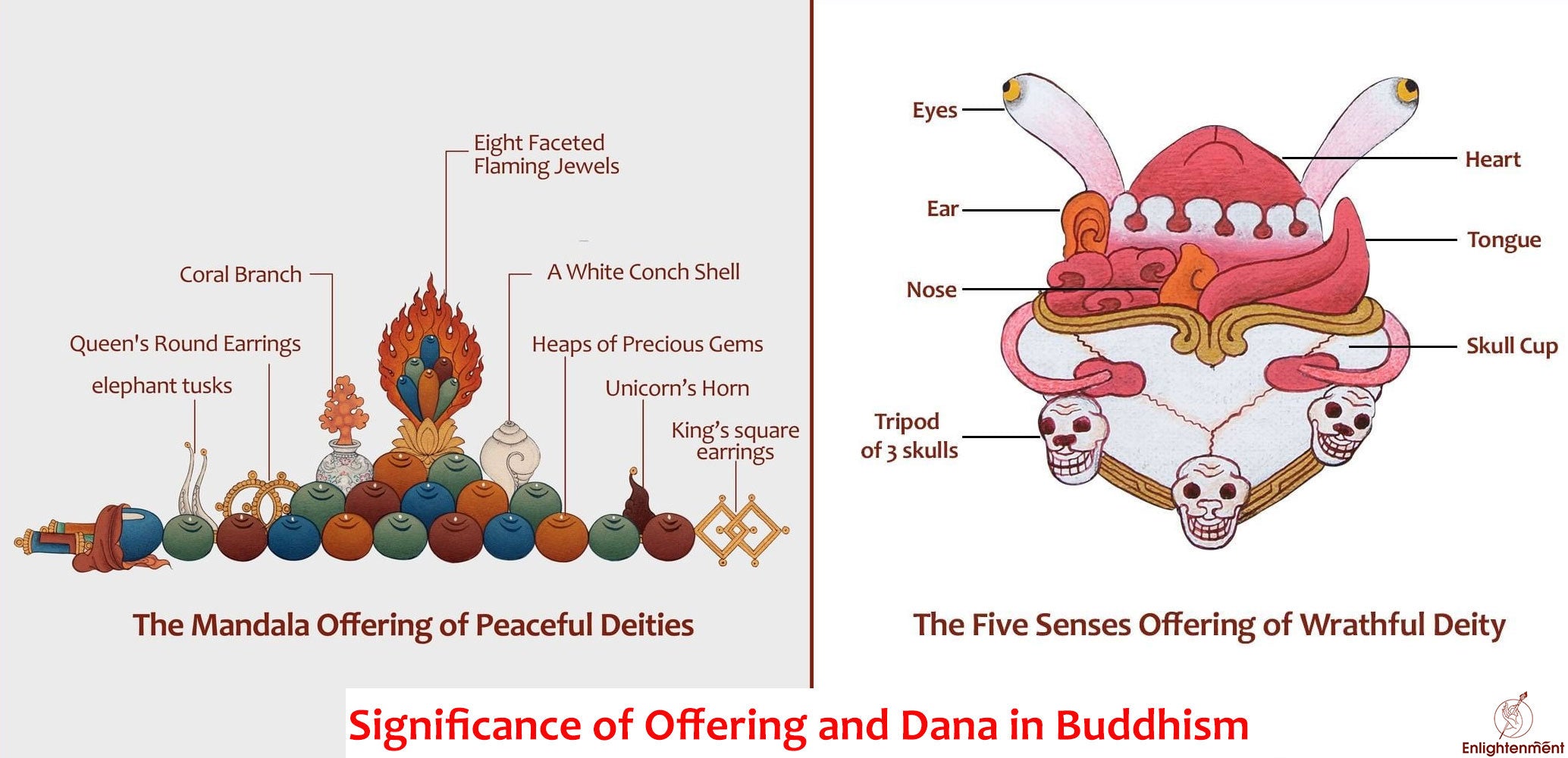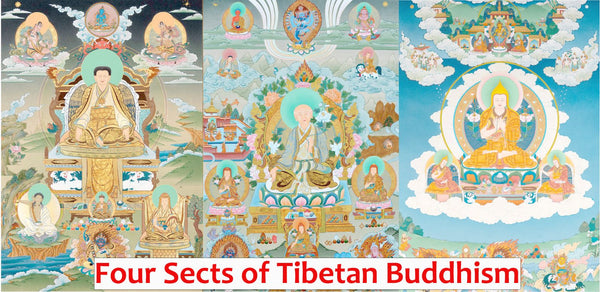Offerings To Buddha
Making offerings is a practice that helps eliminate attachment and miserliness while also building up good karma. Individuals who have attained enlightenment, like the Buddha, do not require our offerings, admiration, or bows. Instead, we engage in these activities because they have a transforming impact on our minds and ultimately life itself.
Paramita is Sanskrit for "perfection" or "completeness." The 6 paramitas (or perfections) of character and understanding, here, "understanding" refers to intellect are frequently mentioned in literature by Mahayana Buddhists. The six perfections contained in Mahayana teachings are among the 10 perfections addressed by the Theravada path.
The Six Paramitas of Buddhism
A Buddhist must attain full understanding and compassion in order to become a Buddha. An easy way to practice these perfections is provided by The Six Perfections. The Six Paramita (Perfection) are:
- Generosity- Dana
- Morality- Sila
- Patience- Ksanti
- Energy- Virya
- Meditation- Dhyana
- Wisdom- Prajna
Giving with pure motivation and intention is called Dana paramita (Sanskrit) or dana parami (Pali). Theravada and Mahayana Buddhism have lists of perfections, but the first perfection on each list is always dana or generosity. One might see the perfections as qualities or strengths that help one reach enlightenment.
The fundamental Buddhist virtue of giving is expressed in offerings, which are formal religious expressions. The first of the six or ten perfections is the perfection of giving, known as dana-paramita in Sanskrit. It includes all acts of generosity, including giving to those higher than us, such as deities in the merit realm or those in need who are less fortunate than us.
Offerings teach one's the mind to get accustomed to giving and letting go of materialistic things. In this sense, it assists us in grasping the fundamental truth that all phenomena are empty of underlying existence. We won't become Buddhas without such realization. The purpose, the recipient's standing, and the offering's caliber are some variables that affect the value of merit obtained from a charitable deed.
"The offering is not because the Buddhas need it or want it. The offering is for you, an opportunity for you to create merit, good karma."-Venerable Zasep Rinpoche.
Explicitly and implicitly, the offerings are likewise an offering to our own Buddha Nature. Of course, it is implied since Mahayana Buddhism teaches that we all possess Buddha Nature. Every sentient being has the capacity to one day become a Buddha. As we all possess Buddha Nature, when we make an offering to the Buddha (any Buddha) we simultaneously make an offering to ourselves and all other creatures.
Explicitly, since we are taught to envision ourselves as Buddhas as our own Buddha Nature maturing in the future to become a perfect Buddha in more advanced practices, in sadhanas (guided meditation techniques), we specifically make "offerings to oneself as Buddha" in the sadhanas. A form of "teaching" is provided by role acting, which includes the gift to ourselves.
Every Tibetan home has a dedicated space where offerings can be made to the Buddha, Dharma, and Spiritual Community, also known as the 'Three Jewels'. A statue, thangka painting, a chapter of scripture, and a stupa or other reliquary item are frequently used to depict the Three Jewels. There is room in front to set up a typical offering arrangement consisting of water basins and, occasionally, a torma ceremonial cake or other food offerings.
- To the Buddha, the Perfectly Enlightened One, himself
- We occasionally set holy sutras and mantras on altars to the Dharma Truth to honor the knowledge revealed in those revered teachings.
- To the Great Compassionate Bodhisattvas, who represents the Noble Enlightened.
"The practice of giving is universally recognized as one of the most basic human virtues, a quality that testifies to the depth of one's humanity and one's capacity for self-transcendence. In the teaching of the Buddha, the practice of giving claims a place of special eminence, one which singles it out as being in a sense the foundation and seed of spiritual development."- Bhikkhu Bodhi, Theravadin Monk & Scholar.
Buddhist Offerings
Source: TibetanbuddhistAltar
- Flowers
One of the most beautiful things in the world is flowers; thus, offering flowers to buddha is the most beautiful thing. They also serve as a reminder that when they fade away, worldly things that we own in this world will also fade away with time which brings to mind the expression, "Whatever is of the nature to originate is also of the nature to end." But in general, we wish to provide the Buddhas and Bodhisattvas with the most exquisite items on earth. People who make floral offerings won't have illnesses and turbidities in the future. There won't be any pollution in the area where they live.
The benefits of offering flowers are as follows,
- Every interaction a person has will be like a flower- people will be happy to see them.
- Their body will be free of any foul odor.
- They will find delight in reading or reciting sutras and seeking the truth.
- Oil Lamps/ Candle/ Butter Lamps
The radiance of our hearts and thoughts to the Buddhas and Bodhisattvas is comparable to the offering of any light source. The way to wisdom is via Buddhism. Therefore, we want to give the Buddha our own minds' brilliance and knowledge rather than dull, muddy brains that are covered over by all of our issues and vices.
Furthermore, providing light during meditation helps us focus our minds and makes it possible to have clear vision. Additionally, giving candles with steady, long-lasting flames promotes long life. Offering light is the most effective way to dispel ignorance's darkness and advance our intelligence.
- Like a brilliant torch, they shall shine luminously onto the world.
- Practitioners will quickly understand the spiritual power of clear vision.
- They will be wise enough to distinguish between right and wrong.
- Fruits and Foods
The Buddha can also be presented with delicious fruits. We do fruit offering to buddha as one of our Buddhist practices. This implies that we practice and follow the Buddhist road until we develop true proficiency in our practices. In this manner, our efforts won't have been in vain and will yield results instead.
Offering food to buddha on a shrine must be only before noon. Be fully equipped with focus and wisdom. The achievement of fulfillment with no outflows will result from the offering of fruits (which is Nirvana: purity and a lack of afflictions).
- They'll live long as they will be physically fit and motivated.
- They will speak with unhindered fluency.
- They won't put off doing their task and constantly earn respect from others.
- Incense and Perfume
The smell of incense might help to quiet the mind. Therefore, when we present incense to the Buddha, we also wish to offer him our mental serenity. We want to extend to the Buddha a little bit more of the kindness we have exhibited in our daily lives and a little more composure and tranquility.
By burning incense, we make it such that we will always be surrounded by pleasant aromas and never reincarnate in unfavorable environments. We also work on achieving perfect focus and maintaining pure moral discipline. When we provide perfume, we advance the causes of achieving excellent moral discipline, escaping samsaric rebirths, and completing the Buddha's physical form.
- Water
Water is seen as being plentiful, accessible, and pleasant to provide. The message of this offering is that we should offer all of our sacrifices in the same way that we would provide water. It is expected that our ethics will be impeccable, like the water we provide. The clarity of the water denotes clarity, while the lightness of the water represents one's mental condition. Offerings are made to Lord Buddha by practitioners out of simple respect and devotion.
We aim to avoid burdening our hearts with harmful activities of the body, tongue, and mind because we don't want the water of our minds to be tarnished by our deeds, thoughts, and the unwholesome words we have uttered.
Tibetan Buddhist Ritual: 'dod-yon sna-lnga
Click here to view High Quality Thangka of Peaceful Deities
Offerings of the five senses, also known as 'dod-yon sna-lnga (Tibetan: "five yearning characteristics," "five strands of desire," or "five qualities of enjoyment"), are delightful sense impressions offered to honor both peaceful and wrathful deities in Tibetan Buddhist rituals.
A mirror, a bell, a stringed musical instrument, incense, nutmeg, fragrant flowers, sugar, a conch filled with curds, or the sacrificial cake gtor-ma(taste) are all included in the offerings presented to peaceful deities to please the sense of form or sight. Silk fabric is also included (touch). The scriptures also mention a sixth sense, that of the intellect, which is rarely acknowledged in ceremonies but may be honored by presenting a piece of scripture.
Click here to view High Quality Thangka of Wrathful Deities
A skull cup-balanced by a tripod of heads containing the five sense organs is the foundation of a wrathful sense offered. These include the tongue to represent taste, the eyes to represent sight, the ears to describe the sound, the nose to represent smell, and the heart or body to represent touch and sensation. They are placed as a "flower gift."
The sixth sense of consciousness is also present, symbolized by a silken arrow piercing the heart. It features a black silk canopy representing the deity's oppressive and obliterating might. Flames are coming from the area around the skull as fresh crimson blood falls from the skull cup. While the literature speaks to these gifts as being constructed from human organs, the ones used in actual rituals are molds produced from barley flour and butter that are accurately colored and shaped.
In essence, offerings made to wrathful deities serve the same purpose as those made to peaceful ones. The offerings symbolize the sacrifices performed as an act of homage and worship. The ones offering will receive countless blessings. After this existence, they shall be reincarnated in the heavens. They will soon understand Nirvana.


